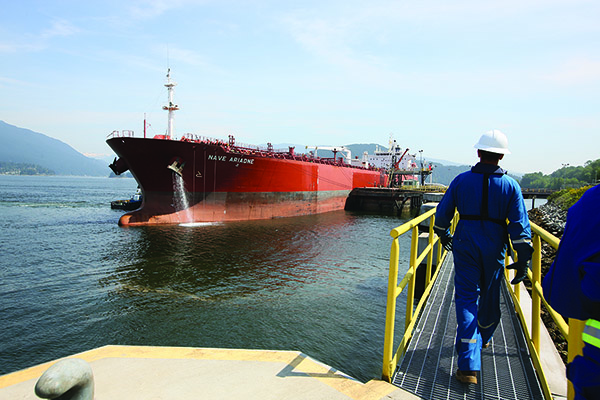Trans Mountain Pipeline Expansion Likely to Send More Canadian Oil to US, Not Asia
(Reuters) — The Trans Mountain pipeline expansion (TMX) was meant to unlock Asian markets for Canadian oil, but analysts and traders said those barrels now will probably land on the U.S. West Coast as Asia gobbles up Russian oil that is cheaper due to sanctions from Western countries after Moscow's invasion of Ukraine.
Asia's heavy crude refining market is roughly nine times the size of California's, but the geopolitical upheaval means Canada will struggle to reduce its reliance on its No. 1 oil customer, the United States.
The troubled C$30.9 billion ($23.5 billion) TMX project, bought by the Canadian government in 2018 to ensure it got built, is finally nearing completion more than a decade after it was first proposed as an expanded gateway to Asia.
Western sanctions on Russian crude following its invasion of Ukraine have upended those plans. Russia has been flooding Asian markets with cheap Urals and ESPO crudes. Canadian barrels will struggle to compete, analysts and traders said.
TMX next year is due to start shipping an extra 590,000 barrels per day (bpd) of crude early from Alberta to British Columbia's Pacific Coast, where it will be loaded onto tankers for export.
"We think a disproportionate amount of those volumes are going actually to PADD 5 (the U.S. West Coast), staying within North America instead of Asia," said John Coleman, principal analyst of North American crude markets at energy consultancy Wood Mackenzie.
Russian crude imports by China and India hit an all-time high in May.
Chinese oil refiners PetroChina and Sinopec have bought and processed Canadian heavy crude in the past.
Their purchases are based on relative affordability, trade sources said. Russia's Urals crude produces higher volumes of fuel and is significantly cheaper than heavy Canadian barrels, said one Calgary-based crude trader.
Another Canadian trader said regulatory delays and environmental opposition have also made TMX less lucrative for producers than it could have been a few years ago.
"A lot of our lunch has been eaten by the Russians and Middle Eastern countries like Iraq," he said.
Heavy Crude Demand
Trans Mountain's original pipeline currently ships around 300,000 bpd of mainly light crude to the U.S. West Coast, with BP's Cherry Point refinery and HF Sinclair Corp.'s Puget Sound refinery among the main customers for Canadian imports, according to U.S. Energy Information Administration data.
The expanded pipeline will transport mostly heavy oil, said Skip York, chief energy strategist at Turner, Mason & Company, and the strongest demand will likely come from refineries in southern California that are set up to process heavy sour crude.
The deep discounts on Russian crude are temporary, said York, and more TMX barrels may head to Asia and displace some Middle Eastern barrels once Western sanctions against Moscow eventually lift.
"Today every crude in Asia is having a hard time competing with Russian crude," York said. "But diluted bitumen ought to compete fairly well against Arab heavy and will compete against Basra heavy."
($1 = 1.3146 Canadian dollars)
Related News
Related News

- Keystone Oil Pipeline Resumes Operations After Temporary Shutdown
- Freeport LNG Plant Runs Near Zero Consumption for Fifth Day
- Biden Administration Buys Oil for Emergency Reserve Above Target Price
- Mexico Seizes Air Liquide's Hydrogen Plant at Pemex Refinery
- Enbridge to Invest $500 Million in Pipeline Assets, Including Expansion of 850-Mile Gray Oak Pipeline





Comments